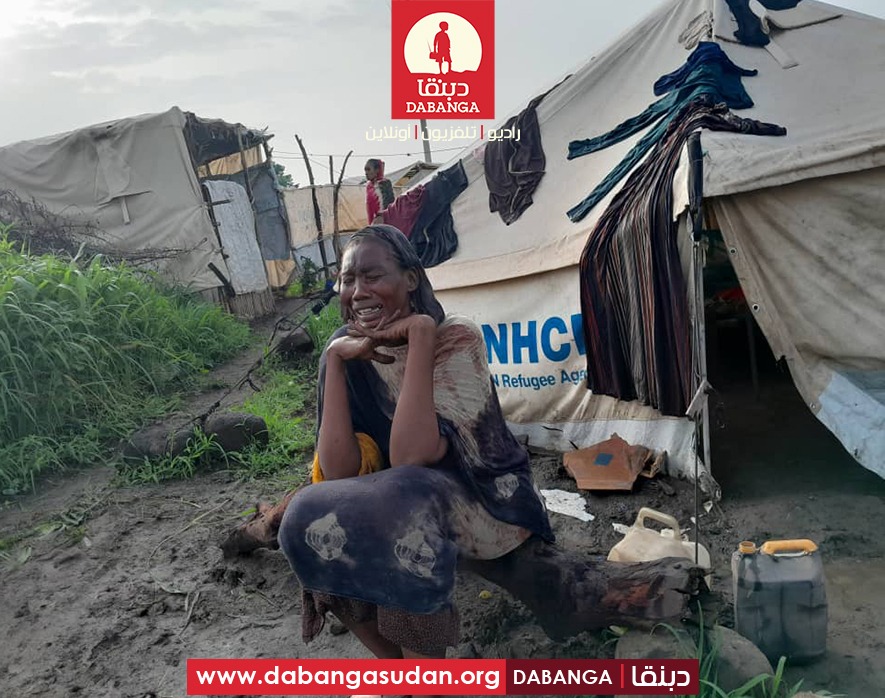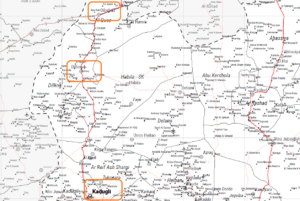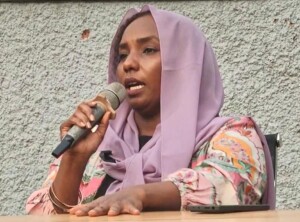HRW: Sudanese in Ethiopia at ‘grave risk’ as security situation deteriorates

Aftermath of armed attack on the Ethiopian police station near the Kumer camp, home to Sudanese refugees (Photo: RD)
Sudanese refugees in Ethiopia’s Amhara region have been subjected to violence, abduction, and forced labour as conflict continues between Ethiopian government forces and Fano militias, according to a new report by Human Rights Watch (HRW).
The report, released yesterday, documents security incidents that have affected refugees who fled Sudan’s conflict from April 2023 until September 2024.
“Sudanese refugees in Ethiopia have been the target of abuses for more than a year by various armed actors,” said Laetitia Bader, deputy Africa director at HRW. “These refugees fled horrific abuses at home and urgently need protection, not further threats to their lives.”
The Amhara region, where most camps housing Sudanese refugees are located, has long experienced tensions, particularly between the Amhara and Qemant communities.
The situation escalated in August 2023 when conflict broke out between Ethiopian military forces and the local Fano militia. This violence endangers refugees living in the region, leaving them vulnerable to attacks by armed groups. Refugees have reported numerous incidents of robbery, beatings, abduction, and murder.
On September 5, Sudan closed its El Gedaref border crossing with Ethiopia due to fighting, after control was seized by the Fano militia.
Insecurity in camps
“They asked me about my telephones, money. [They warned that] if I said no, they would shoot me. I gave them my phone. They still shot into my tent. My children were afraid.”
Thousands of Sudanese refugees have been living in the Awlala and Kumer camps in Ethiopia’s West Gonder region since fleeing conflict in their home country. However, these camps have been plagued by violence and insecurity due to their proximity to conflict zones.
One Awlala camp resident described the violence to HRW: “You would many see young men crossing the camp, carrying guns. […] We were trapped in the middle…”
In August of 2023, an estimated 6,000 Sudanese refugees participated in demonstrations at Awlala camp over the scarce food and medicine provided to them. They also demanded protection from attacks by local militiamen.
In April 2024, more than 1,000 refugees protested against the ongoing insecurity by marching towards the United Nations Refugee Agency (UNHCR) office in Gonder. They were blocked by Ethiopian police and forced to take shelter in a forested area along the road. For the next several months, they faced regular attacks from gunmen, leading some refugees to return to Sudan.
On July 17, 2024, unidentified gunmen attacked the Kumer camp, killing ten Ethiopian federal police officers who were stationed near the camp. The attack left the refugees unprotected. The Ethiopian Refugees and Returnees Service (RRS) confirmed that 11 additional officers were injured in the attack.
The HRW report states that armed groups target refugees, especially those with valuables, such as smartphones. “Three men carrying guns came to my tent one night where I was sleeping with my daughters and son…. They asked me about my telephones, money. [They warned that] if I said no, they would shoot me. I gave them my phone. They still shot into my tent. My children were afraid”, said one refugee.
Additionally, several refugees have been forced into labour by militias operating near the camps. Refugees have been taken from the camps and forced to work on local farms, with the HRW report verifying at leat 347 cases of forced labour in 2023 and 2024. “When the militias find us, they ask for a phone or money. If they don’t find anything, they take you away and force you to work on their farms,” one refugee told HRW.
Forced relocation
“Someone asked the military and police to stop beating me in front of my kids. They started insulting us, saying if we didn’t want to stay in Ethiopia, then we should go back to our country, to Sudan”
Inadequate security, compounded by the escalating conflict between Fano militias and Ethiopian federal forces, eventually led the UNHCR to close Awlala and Kumer camps in July 2024. Refugees were relocated to the Aftit camp, but conditions remained dire, with many expressing concerns over the potential for further violence.
Refugees who attempted to cross the border were met by Ethiopian security forces, who forcibly separated families and pressured refugees to hand over their identification documents. Many were beaten or coerced into returning to the Metema transit centre.
“Someone asked the military and police to stop beating me in front of my kids. They started insulting us, saying if we didn’t want to stay in Ethiopia, then we should go back to our country, to Sudan”, a Sudanese refugee told HRW.
The relocation to Aftit and the Metema transit centre did little to alleviate the challenges faced by Sudanese refugees. Food shortages and a lack of basic services, including shelter and medical care, persist. Many refugees reported receiving only minimal food aid, such as biscuits, for weeks. Clashes between Ethiopian soldiers and Fano militia further destabilised the camps, with refugees often caught in the crossfire.
In one instance, a Fano militia group entered the Metema transit centre and clashed with Ethiopian forces. Refugees, who were caught in the fighting, described how they feared for their lives as gunmen fired near their tents. A refugee at the centre recounted being forced by the militia to carry the body of a deceased fighter out of the camp.
Many refugees also reported being coerced into returning to Sudan, often being separated from their families in the process. Although Ethiopian and UNHCR officials claimed that these returns were voluntary, HRW’s investigation revealed that many felt pressured to leave. One refugee said she was separated from her children, who were pushed back into Sudan while she was sent to the Metema transit centre.
Response
Ethiopia’s Refugees and Returnees Service denied allegations of forced relocations, stating that the government maintains a “zero tolerance” policy towards the abuse of refugees, and calling the allegations “unfounded and erroneous”.
Despite these assurances, Human Rights Watch has urged the Ethiopian government to protect the refugees in its territory. “The Ethiopian government should fulfill its obligations to protect refugees and relocate them to safer areas away from conflict zones,” Bader said.
Since the conflict began in Sudan, Ethiopia has received more than 90,000 Sudanese refugees and asylum seekers, including more than 38,000 who fled after the fighting broke out in April 2023 between the Sudanese Armed Forces and the Rapid Support Forces (RSF).
The report, ‘Ethiopia: Fighting, Abuses Putting Sudanese Refugees at Risk’, is accessible on the HRW website.











 and then
and then